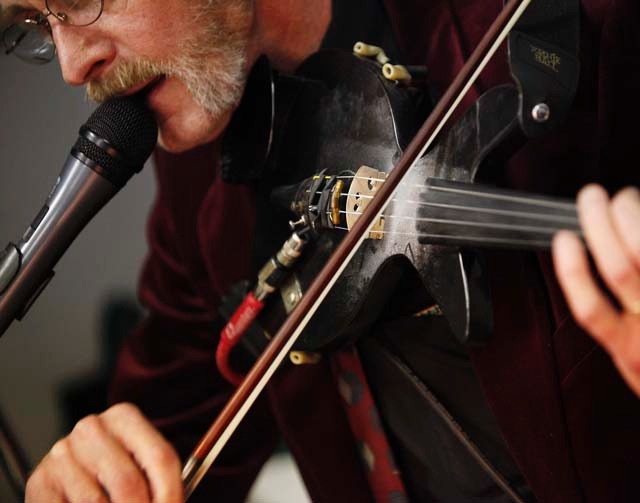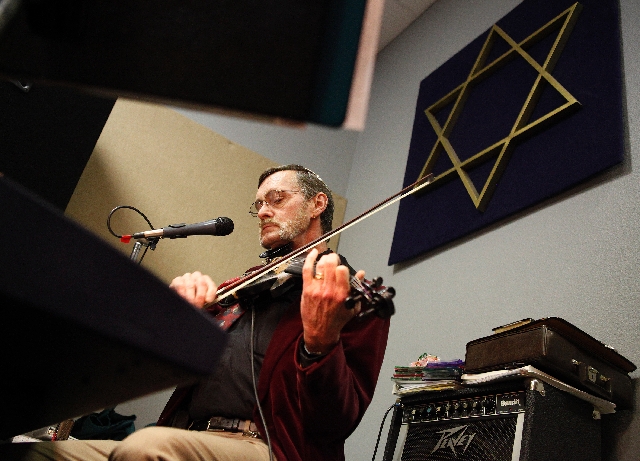Synagogue band becomes sole outlet for longtime musician
Jim Jones opens a random box and counts the blue towels inside.
The quantity has to match the packing receipt, otherwise someone gets cheated. He’s decided to spot-check this order because a similar one was short a few pieces.
When he’s done with the UPS and FedEx shipments, Jones, a receiving clerk who has worked on The Mirage loading dock for nearly 24 years, will help out with the standard stuff: beer, food, cleansers, clothing, paper goods, anything that restocks the restaurant pantries, housekeeping carts and nearly every department in the resort.
Jones is one of 30 people who work on The Mirage loading dock, a part of the hotel that remains mostly hidden from the guest’s eye. About the only time you’ll notice them is when something goes wrong, and that rarely happens, Jones says.
In any given shift, Jones may receive shipments as small as a diamond ring or a pair of reading glasses addressed to a guest. About 80 percent of the packages that come into the resort are for guests, he says.
Or Jones may check in 18,000 dozen eggs, three times a day. It’s the sort of job that doesn’t require a specialized degree, but it helps to have a knack for numbers and a meticulous nature.
“It can be dry work, what with the numbers,” Jones’ supervisor, Bill Oglesby says.
Jones, who has a mind for math and organizing, loves his work, even though he had far different plans when he first moved to Las Vegas in 1978. Like any 23-year-old musician, he envisioned a long career playing his violin in bands around town.
And he did that, for a while. When he came here from Tennessee with his then-wife, the local music scene was hot and gigs were plentiful. Now, at 58, the only gigs Jones cares about are his weekly performances with the band at Lev HaShem Messianic Congregation of Las Vegas.
Jones was born in Tennessee, the second of three boys. He grew up in Dayton, a small town made famous by the Scopes Monkey trial of 1925. The trial, in which high school teacher John Scopes was accused of teaching evolution, was staged to gin up publicity for the town after its population had dwindled. Civic leaders thought a sensational trial would draw new residents. It drew the nation into a dramatic battle of creationists versus evolutionists.
The Jones family was headed by Guy, a flight instructor who had learned how to fly airplanes so he could haul Canadian whiskey across the border during Prohibition. He wrote a book called “The Last Barnstormer” and was one of the last American civilians who could designate an airport.
His wife and Jim’s mother, Bertha, was a semiprofessional roller skater. The young couple and their children fit right in to the quirky fabric of Dayton.
Jim Jones learned to skate before he could walk. At 14, he flew solo for the first time. When he was 18, he got his commercial pilot’s license. He briefly entertained the idea of becoming a professional pilot but once he discovered music, his fate was sealed.
When he was in sixth grade, Jones took up the trombone. His band teacher was cool and made a significant impression on him.
“He went camping with us,” Jones says. “I thought, ‘I could be a band director and do this for the rest of my life.’ He seemed to have a good job.”
After graduating, Jones enrolled in Tennessee Tech University to study marching band with an emphasis in trombone. His goal was to take classical music to the marching field. Jones, who calls Ludwig van Beethoven his main man, loved classical music.
One day, a music professor made him take a violin class.
“They wanted us to be able to teach strings,” Jones recalls. “As soon as I picked it up, I fell in love with it.”
He switched his major to violin. Three months later, Jones was playing Mozart’s “The Marriage of Figaro” in an orchestra pit.
“I was no virtuoso but I could play the notes,” he says.
A classmate introduced him to bluegrass and invited him to play in his band. After finishing up his degree at Middle Tennessee State University, Jones embarked on a career as a professional fiddle player.
In the 1970s, musicians from around the world were drawn to Las Vegas. It was a place where they could settle down and earn a decent living without straying too far from home, says Dawn McCoy, a longtime friend of Jones.
That changed when local venues cut back on live entertainment.
“Jim’s a real mellow sort of man,” friend and guitar player Warren Kasendorf says. The two met about 30 years ago at an audition and went on to play together for several years. “He knew what he was doing. He was well-studied, and I learned a lot just by being with him and playing with him. I’m surprised that he’s just still working at Mirage doing that. I always figured he would have gone on further with music.”
He went as far as he could before realizing that the music scene was fading, at least for full-time musicians. One night, when he was returning from a gig in Pahrump, he passed a bar called Crackers. The sign out front advertised that the legendary Edgar Winter was playing there. The next week, the sign said “Marshall Tucker band.”
“That convinced me yeah, do it on the side,” Jones says. “The guys who played during the week couldn’t get work anymore. And you couldn’t live playing weekends, you couldn’t do it. Not only were the jobs getting rarer locally, they were getting farther away.”
He never envisioned playing in a religious setting but when the opportunity presented itself, it made sense to him.
“It means I don’t have to be out in the bar at 2 in the morning,” he says, only half-joking. “But this is all probably just part of the master plan to bring me to where I am today.”
Contact reporter Sonya Padgett at
spadgett@reviewjournal.com
or 702-380-4564.
Follow @StripSonya on Twitter.
































